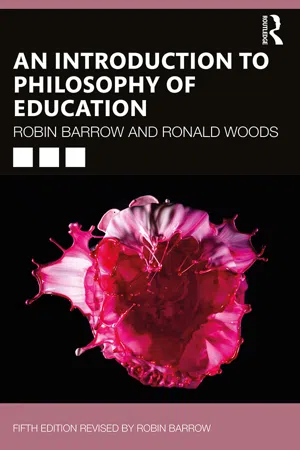
- 250 pages
- English
- ePUB (mobile friendly)
- Available on iOS & Android
An Introduction to Philosophy of Education
About this book
This introductory text, now in its fifth edition, is a classic in its field. It shows, first and foremost, the importance of philosophy in educational debate and as a background to any practical activity such as teaching. What is involved in the idea of educating a person or the idea of educational success? What are the criteria for establishing the optimum balance between formal and informal teaching techniques? How trustworthy is educational research? In addition to these questions, which strike to the heart of the rationale for the educative process as a whole, the authors explore such concepts as culture, creativity, autonomy, indoctrination, needs, interests, and learning by discovery. Updates to this edition include new chapters on religious education and moral education, as well as questions for reflection at the end of each chapter.
Frequently asked questions
- Essential is ideal for learners and professionals who enjoy exploring a wide range of subjects. Access the Essential Library with 800,000+ trusted titles and best-sellers across business, personal growth, and the humanities. Includes unlimited reading time and Standard Read Aloud voice.
- Complete: Perfect for advanced learners and researchers needing full, unrestricted access. Unlock 1.4M+ books across hundreds of subjects, including academic and specialized titles. The Complete Plan also includes advanced features like Premium Read Aloud and Research Assistant.
Please note we cannot support devices running on iOS 13 and Android 7 or earlier. Learn more about using the app.
Information
1 On Reading This Book
Objectives
1. To develop understanding of the nature of analytic philosophy
2. To enable readers to recognize and appreciate its practical value
3. To provide an argument for a particular view of the educational enterprise overall
Concepts
Further Features of Philosophy
Philosophy in Action
Different Types of Meaning
Table of contents
- Cover
- Half Title
- Title Page
- Copyright Page
- Dedication
- Table of Contents
- Acknowledgments
- Preface
- 1. On Reading This Book
- 2. Thinking about the Educational System
- 3. What is it to be Human?
- 4. Do We Need Schools?
- 5. Needs and Interests
- 6. The Concept of Education
- 7. Knowledge: What is Worth Studying
- 8. Curriculum Theory
- 9. Religion and Religious Education
- 10. Morality and Moral Education
- 11. Indoctrination
- 12. Rationality
- 13. Critical Thinking and Other Skills
- 14. Freedom and Autonomy
- 15. Relativism: The Challenge to Reason
- 16. Creativity
- 17. Multiculturalism and Racism
- 18. Culture
- 19. Research into Teaching
- 20. Conclusion: Theory and Practice
- Appendix
- Index